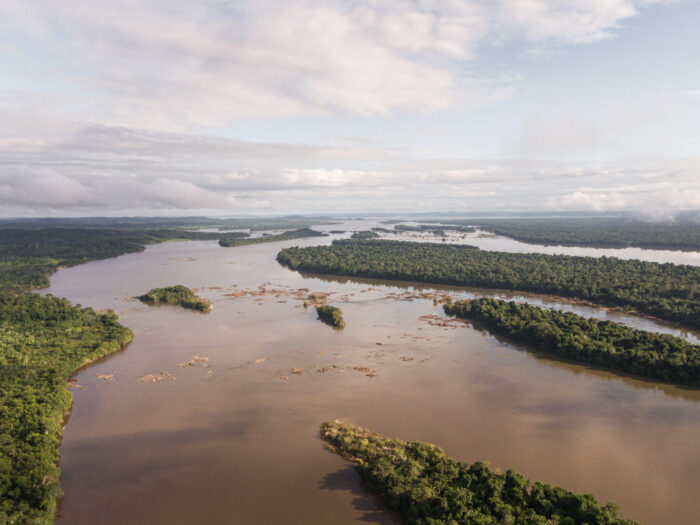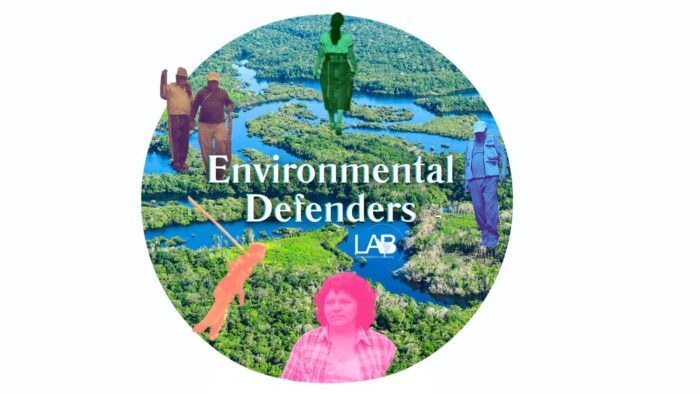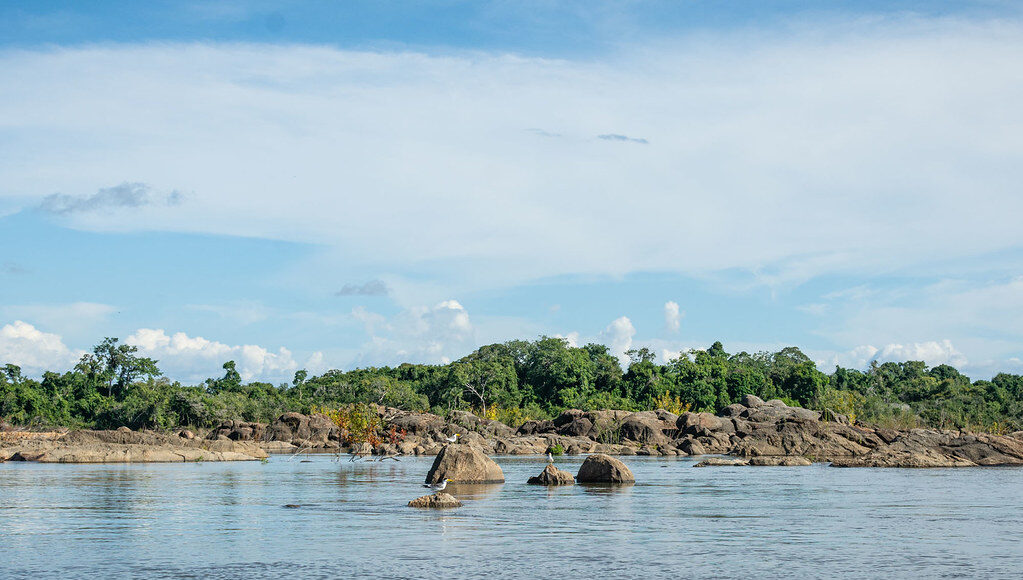The Canadian gold mining company’s criminal lawsuit attempts to silence and intimidate defenders of the Volta Grande do Xingú, including community leaders, Amazon Watch, and other environmental and human rights activists. This piece was originally published by Amazon Watch here.
Main image: Rio Xingu. Cícero Pedrosa Neto/Amazônia Real
Due to our longstanding opposition to Belo Sun’s plans to carve Brazil’s largest open-pit gold mine on the banks of the Amazon’s Xingu River, the company seeks to criminalize Amazon Watch, its partners at International Rivers and Movimento Xingu Vivo, and local community representatives whose way of life is imperiled by the mine.

Belo Sun’s Volta Grande Project, is currently proposed on the Xingu River’s Volta Grande, or “Big Bend.” This region of the Amazonian state of Pará has already suffered massive impacts from the construction of the Belo Monte mega-dam. Belo Sun’s opponents understand that the company’s plans would destroy what remains of a critically important and unique riverine ecosystem with dire implications for the rainforest and the local communities who rely on the Xingu for their wellbeing and livelihoods.
Since 2012, Amazon Watch has supported Indigenous and local community resistance to Belo Sun’s proposed mine, shining a spotlight on its manifold risks to the region’s cultural and biological diversity. To stop the company’s plans we are coordinating an international alliance to denounce Belo Sun, pressure Brazilian and Canadian authorities to prevent the project’s approval, and expose the truth about its reputation to investors.
The company’s efforts to silence its critics is the same version of the SLAPP suit strategy used by corporations in the U.S. and Europe, with even more chilling consequences in Brazil. Amazon Watch is no stranger to being targeted in this way, which is why we are a part of the Protect the Protest Task Force to stand together with allies fighting back against legal bullying. Of course, these tactics only serve to strengthen our resolve and that of our allies.
The criminal complaint represents a glaring attempt to deter environmental and human rights defenders, a suppression exacerbated by the presence of the company’s armed security in the territory. Furthermore it seeks to criminalize organizations that diligently monitor and denounce the destruction caused by large projects in the Volta Grande do Xingu.
On November 15, a coalition of 25 local movements and organizations, primarily centered in Altamira, Pará, issued an open letter vehemently condemning the criminalization efforts directed at farmers, social movements, and civil society organizations instigated by Belo Sun. It is essential that the terms of this letter be strengthened and echoed both nationally and internationally.
In early December 2023, civil society organizations launched a solidarity statement affirming support for social movements, organizations, and rights advocates who have become victims of criminalization attempts by the company.
Criminalizing local resistance
The subjects of Belo Sun’s lawsuit are individuals who have monitored, questioned, or denounced the irregular acquisition of land reform parcels by the mining company within the Ressaca Land Settlement Project, in the municipality of Senador José Porfírio in the state of Pará. They are demanding the return of this land seized by the company to small-scale farmers.
According to independent researchers, by the end of 2021, Belo Sun had unlawfully acquired a total of 3,945 hectares (9,748 acres) of public lands, with 1,761 hectares within the Ressaca settlement and 1,734 hectares in an area contiguous to the settlement. It’s important to note that the acquisition of land reform plots by companies is illegal in Brazil. And even if it were legal, obtaining such an extensive plot of land would also require, as per the Brazilian Constitution, prior approval from the National Congress.
In November 2021, the National Institute for Colonization and Agrarian Reform (INCRA), disregarding these legal violations and without initiating a collective participation process with farmers and local communities, entered into a contract that granted Belo Sun the use of 1,439 hectares within the Ressaca settlement and 989 hectares in the Ituna Gleba settlement.
These facts serve as the foundation for a lawsuit filed in federal court by the federal and state Public Defender’s offices in early 2023. The suit aims to annul the land deal through which Belo Sun purchased these lands from INCRA. As of now, it has not yet received a ruling.
Recognizing the illegal nature of this situation and fearing potential land loss due to the inaction of public authorities, a group of farmer families decided to form their own movement. The goal of this movement is to lawfully and peacefully reoccupy the areas which were irregularly granted to Belo Sun within the Ressaca settlement.
Both the occupation, which took place on June 5, 2022, and the subsequent establishment of a camp on the disputed land plots, constitute a form of political protest. Their primary objective is to highlight the illegality of the transactions between INCRA and Belo Sun and demand the return of the plots to their intended purpose of serving agrarian reform, as is their rightful use.
This is not the first instance of Belo Sun attempting to intimidate civil society organizations and human rights defenders. In 2022, the company filed a lawsuit against a university professor who had exposed the risks posed by the Volta Grande Project to the Xingu River and its people. In mid-2023, Belo Sun issued an extrajudicial notice to the Association of Brazil’s Indigenous Peoples (APIB), attempting to suppress the organization’s complaints regarding the risks associated with the mining project in the Volta Grande do Xingu.
This notice came shortly after the release of a report on Belo Sun by APIB’s legal team, incorporating data from Amazon Watch’s previous assessment entitled ”Risks of Investing in Belo Sun”, launched in 2022 during the U.N. Biodiversity Conference (COP 15) in Montreal. Additionally, there was an international advocacy action at the U.N. in Geneva orchestrated by Amazon Watch, international allies, and Indigenous partners, including APIB. This event unveiled new data on Belo Sun’s human rights and environmental violations, shedding light on corporate abuses by Canadian companies not only in the Brazilian Amazon but also in eight other countries in Latin America and the Caribbean.
Background on Belo Sun’s activities in the Volta Grande do Xingu
Belo Sun aims to establish a massive open pit gold mining project that overlaps with the Ressaca settlement, situated on the banks of the Xingu River. If approved, this project would significantly and potentially irreversibly impact a territory already severely affected by the Belo Monte mega-dam, adversely affecting the lands and traditional ways of life of various Indigenous peoples, rural settlements, and riverside communities in this region.
Several lawsuits have been filed, meticulously documenting the multiple irregularities committed by Belo Sun. These include the absence of free, prior, and informed consultation and consent (FPIC) from the affected Indigenous and traditional communities, the illegal acquisition of plots within the Ressaca settlement, harassment and violation of the right to free movement and access to the territory of local communities, and the lack of legal authority of Pará state to issue the environmental license for the Volta Grande project. The licensing process has been suspended since 2017 by the decision of the Federal Regional Court of the 1st Region. On September 11, 2023, it was transferred to the jurisdiction of IBAMA, the Brazilian federal environmental agency.
Amazon Watch’s legal advisor and campaign advisor have been actively engaged on multiple fronts, providing technical support to the communities, working on advocacy and legal strategies and campaigns, supporting the work of public defenders and prosecutors, and defending the rights of the defenders of the Volta Grande do Xingu. We are mobilizing national and international communities to join the #StopBeloSun effort, and keep #MiningOut of Indigenous Territories and the Amazon.

LAB’s Environmental Defenders Series documents some of the work of environmental defenders in different Latin American countries, highlighting both the dangers they face and their achievements in defending their habitats and communities.
We aim to inform, motivate and connect an English-speaking public with the inspirational stories of grassroots Environmental Defenders’ work in Latin America and give EDs from countries where their battles are under-reported a greater voice.
We are working in partnership with trusted Latin American independent outlets. Find a full list, as well as further details of the series, here. Help us bring these stories to a wide audience by sharing them widely on social media.

